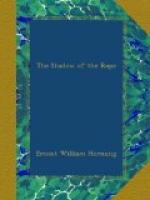“My dear fellow,” he said, “forgive my levity. If you have really found out anything, it is a miracle; but miracles do happen now and then. Here’s the pond, and there’s the boathouse behind those rhododendrons. Suppose you tell me the rest in the boat? We needn’t keep looking over our shoulders in the middle of the pond!”
For an instant Langholm dreamt of the readiest and the vilest resource; in another he remembered, not only that he could swim, but the insidious sympathy for this man which a darker scoundrel had sown in his heart. It had grown there like Jonah’s gourd; only his flippancy affected it; and Steel was far from flippant now. Langholm signed to him to lead the way, and in a very few minutes they were scaring the wildfowl in mid-water, Steel sculling from the after thwart, while Langholm faced him from the crimson cushions.
“I thought,” said the latter, “that I would like to tell you what sort of evidence I could get against him before—before going any further. I—I thought it would be fair.”
Steel raised his bushy eyebrows the fraction of an inch. “It would be fairest to yourself, I agree. Two heads are better than one, and—well, I’m open to conviction still, of course.”
But even Langholm was not conscious of the sinister play upon words; he had taken out his pocket-book, and was nervously turning to the leaves that he had filled during his most sleepless night in town.
“Got it all down?” said Steel.
“Yes,” replied Langholm, without raising his eyes; “at least I did make some notes of a possible—if not a really damning—case against the man I mean.”
“And what may the first point be?” inquired Steel, who was gradually drifting back into the tone which Langholm had resented on the shore; he took no notice of it now.
“The first point,” said Langholm, slowly, “is that he was in Chelsea, or at least within a mile of the scene of the murder, on the night that it took place.”
“So were a good many people,” remarked Steel, smiling as he dipped the sculls in and out, and let his supple wrists fall for the feather, as though he were really rowing.
“But he left his—he was out at the time!” declared Langholm, making his amended statement with all the meaning it had for himself.
“Well, you can’t hang him for that.”
“He will have to prove where he was, then.”
“I am afraid it will be for you to prove a little more first.”
Langholm sat very dogged with his notes. There had been a pause on Steel’s part; there was a thin new note in his voice. Langholm was too grimly engrossed to take immediate heed of either detail, or to watch the swift changes in the face which was watching him. And there he lost most of all.
“The next point is that he undoubtedly knew Minchin in Australia—”
“Aha!”
“That he was and is a rich man, whereas Minchin was then on the verge of bankruptcy, and that Minchin only found out that he was in England thirty-six hours before his own death, when he wrote to his old friend for funds.”




